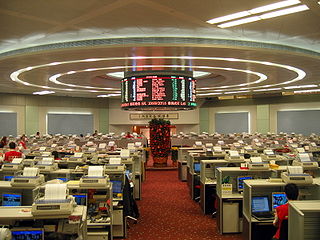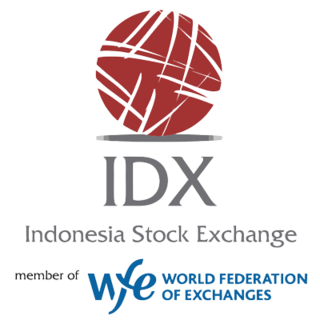
The Nasdaq Stock Market is an American stock exchange based in New York City. It is the most active stock trading venue in the U.S. by volume, and ranked second on the list of stock exchanges by market capitalization of shares traded, behind the New York Stock Exchange. The exchange platform is owned by Nasdaq, Inc., which also owns the Nasdaq Nordic stock market network and several U.S.-based stock and options exchanges. Although it trades stock of healthcare, financial, media, entertainment, retail, hospitality, and food businesses, it focuses more on technology stocks. The exchange is made up of both American and foreign firms, with China and Israel being the largest foreign sources.

The New York Stock Exchange is an American stock exchange in the Financial District of Lower Manhattan in New York City. It is the largest stock exchange in the world by market capitalization, exceeding $25 trillion in July 2024. The NYSE is owned by Intercontinental Exchange, an American holding company that it also lists. Previously, it was part of NYSE Euronext (NYX), which was formed by the NYSE's 2007 merger with Euronext. According to a Gallup poll conducted in 2022, approximately 58% of American adults reported having money invested in the stock market, either through individual stocks, mutual funds, or retirement accounts.

Day trading is a form of speculation in securities in which a trader buys and sells a financial instrument within the same trading day, so that all positions are closed before the market closes for the trading day to avoid unmanageable risks and negative price gaps between one day's close and the next day's price at the open. Traders who trade in this capacity are generally classified as speculators. Day trading contrasts with the long-term trades underlying buy-and-hold and value investing strategies. Day trading may require fast trade execution, sometimes as fast as milli-seconds in scalping, therefore direct-access day trading software is often needed.

The Stock Exchange of Hong Kong is a stock exchange based in Hong Kong. It is one of the largest stock exchanges in Asia and the 9th largest globally by market capitalization as of August 2024. The exchange plays a crucial role in connecting international investors with mainland Chinese companies, serving as a major platform for capital raising. Unlike mainland Chinese exchanges, it operates under Hong Kong’s distinct regulatory framework, which allows greater access to foreign investors.
The National Stock Exchange (NSX) is an electronic stock exchange based in Jersey City, New Jersey. It was founded March 1885 in Cincinnati, Ohio, as the Cincinnati Stock Exchange.

The Securities Exchange Act of 1934 is a law governing the secondary trading of securities in the United States of America. A landmark piece of wide-ranging legislation, the Act of '34 and related statutes form the basis of regulation of the financial markets and their participants in the United States. The 1934 Act also established the Securities and Exchange Commission (SEC), the agency primarily responsible for enforcement of United States federal securities law.
Penny stocks are common shares of small public companies that trade for less than five dollars per share. The U.S. Securities and Exchange Commission (SEC) uses the term "Penny stock" to refer to a security, a financial instrument which represents a given financial value, issued by small public companies that trade at less than $5 per share. Penny stocks are priced over-the-counter, rather than on the trading floor. The term "penny stock" refers to shares that, prior to the SEC's classification, traded for "pennies on the dollar". In 1934, when the United States government passed the Securities Exchange Act to regulate any and all transactions of securities between parties which are "not the original issuer", the SEC at the time disclosed that equity securities which trade for less than $5 per share could not be listed on any national stock exchange or index.
An electronic communication network (ECN) is a type of computerized forum or network that facilitates the trading of financial products outside traditional stock exchanges. An ECN is generally an electronic system accessed by an electronic trading platform that widely disseminates orders entered by market makers to third parties and permits the orders to be executed against them in whole or in part. The primary products that are traded on ECNs are stocks and currencies. ECNs are generally passive computer-driven networks that internally match limit orders and charge a very small per share transaction fee.

The Philippine Stock Exchange, Inc. is the national stock exchange of the Philippines. The exchange was created in 1992 from the merger of the Manila Stock Exchange and the Makati Stock Exchange. Including previous forms, the exchange has been in operation since 1927. The PSE's headquarters is located at the Philippine Stock Exchange Tower, located along the One Bonifacio High Street complex in Bonifacio Global City.
The Small-Order Execution System (SOES) was a system to facilitate clearing trades of low volume on Nasdaq. It has been phased out and is no longer necessary.

Indonesia Stock Exchange (IDX) is a stock exchange based in Jakarta, Indonesia. It was previously known as the Jakarta Stock Exchange (JSX) before its name changed in 2007 after merging with the Surabaya Stock Exchange (SSX). In recent years, the Indonesian Stock Exchange has seen the fastest membership growth in Asia. As of December 2024, the Indonesia Stock Exchange had 943 listed companies, and total number of investors has already grown to 14.8 million. Indonesia Market Capitalization accounted for 45.2% of its nominal GDP in December 2020. Founded on 30 November 2007, it is ASEAN's largest market capitalization at US$881 billion as of 19 September 2024.
In business, the trading day or regular trading hours (RTH) is the time span that a stock exchange is open, as opposed to electronic or extended trading hours (ETH). For example, the New York Stock Exchange is, as of 2020, open from 9:30 AM Eastern Time to 4:00 PM Eastern Time. Trading days are usually Monday through Friday. When a trading day ends, all trading ends and is frozen in time until the next trading day begins. There are several special circumstances which would lead to a shortened trading day, or no trading day at all, such as on holidays or on days when a state funeral of a head of state is scheduled to take place.

Intercontinental Exchange, Inc. (ICE) is an American multinational financial services company formed in 2000 that operates global financial exchanges and clearing houses and provides mortgage technology, data and listing services. Listed on the Fortune 500, S&P 500, and Russell 1000, the company owns exchanges for financial and commodity markets, and operates 12 regulated exchanges and marketplaces. This includes ICE futures exchanges in the United States, Canada, and Europe; the Liffe futures exchanges in Europe; the New York Stock Exchange; equity options exchanges; and OTC energy, credit, and equity markets.
National Stock Exchange of Australia (NSX) is a stock exchange based in Sydney, New South Wales, Australia. It is owned and operated by NSX Limited, which is listed on the Australian Securities Exchange on 13 January 2005. On 20 December 2006 the Newcastle Stock Exchange formally sought approval and was granted a change of name by the minister to National Stock Exchange of Australia and still trades by the acronym of "NSX".
In finance, a dark pool is a private forum for trading securities, derivatives, and other financial instruments. Liquidity on these markets is called dark pool liquidity. The bulk of dark pool trades represent large trades by financial institutions that are offered away from public exchanges like the New York Stock Exchange and the NASDAQ, so that such trades remain confidential and outside the purview of the general investing public. The fragmentation of electronic trading platforms has allowed dark pools to be created, and they are normally accessed through crossing networks or directly among market participants via private contractual arrangements. Generally, dark pools are not available to the public, but in some cases, they may be accessed indirectly by retail investors and traders via retail brokers.
High-frequency trading (HFT) is a type of algorithmic trading in finance characterized by high speeds, high turnover rates, and high order-to-trade ratios that leverages high-frequency financial data and electronic trading tools. While there is no single definition of HFT, among its key attributes are highly sophisticated algorithms, co-location, and very short-term investment horizons in trading securities. HFT uses proprietary trading strategies carried out by computers to move in and out of positions in seconds or fractions of a second.

The May 6, 2010, flash crash, also known as the crash of 2:45 or simply the flash crash, was a United States trillion-dollar flash crash which started at 2:32 p.m. EDT and lasted for approximately 36 minutes.
Direct Edge was an American stock exchange that operated two separate platforms, EDGA Exchange and EDGX Exchange. It was based in Jersey City, New Jersey and merged with BATS Global Markets in 2014.

Investors Exchange (IEX) is a stock exchange in the United States. It was founded in 2012 in order to mitigate the effects of high-frequency trading. IEX was launched as a national securities exchange in September 2016. On October 24, 2017, it received regulatory approval from the U.S. Securities and Exchange Commission (SEC) to list companies. IEX listed its first public company, Interactive Brokers, on October 5, 2018. The exchange said that companies would be able to list for free for the first five years, before a flat annual rate of $50,000. On September 23, 2019, it announced it was leaving its listing business.
For three hours on August 22, 2013, trading was halted on the Nasdaq Stock Market. Trading on the exchange stopped at 12:14 pm and resumed at 3:25 pm, with 35 minutes left of trading for the day. One week after the trading halt NASDAQ OMX credited the freeze to an overloading of the Securities Information Processor (SIP) caused by reconnection issues with the New York Stock Exchange Arca. The freeze received substantial media coverage and generated discussions on the security of increasingly technologically advanced stock exchanges. The event coined the term "flash freeze" following the earlier "flash crash" on May 6, 2010.











